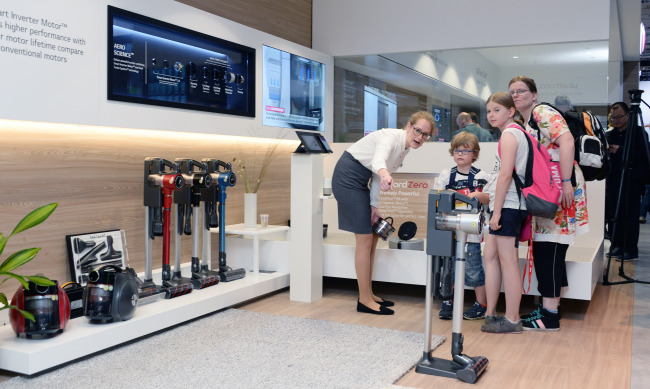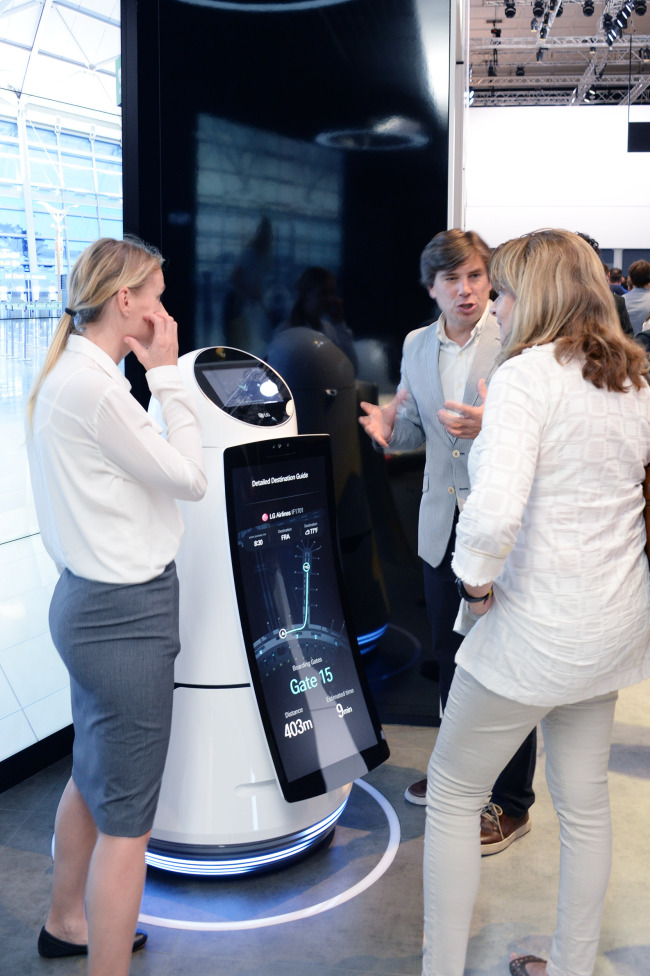[IFA 2017] IFA paints picture of new lifestyle with IoT, AI tech
Korean firms go all out on smart home presentation, less focus paid to energy-saving features
By Song Su-hyunPublished : Sept. 3, 2017 - 16:16
BERLIN -- Appliances that improve convenience and save time using the Internet of Things and artificial intelligence seemed no longer to be the stuff of vague imagination at the IFA 2017 tech show in the German capital.
As the biggest tech show in Europe nears the end of its six-day run, one of the main trends that emerged is that IoT has become a basic component of both large and small home appliances, while AI is being added as an extra feature to those connected products.
Another noticeable change this year is that fewer exhibitors displayed products related to energy saving.
Leading home appliance makers including Samsung, LG and Sony allocated significant space at their booths to show off their smart home studios, but with different emphases.
As the biggest tech show in Europe nears the end of its six-day run, one of the main trends that emerged is that IoT has become a basic component of both large and small home appliances, while AI is being added as an extra feature to those connected products.
Another noticeable change this year is that fewer exhibitors displayed products related to energy saving.
Leading home appliance makers including Samsung, LG and Sony allocated significant space at their booths to show off their smart home studios, but with different emphases.

“An interesting trend is that Asian home appliances try to showcase how a smart home of the future would look like by installing studios filled with IoT and AI home appliances, while European companies like Bosch and Siemens seem like they focused on enhancing the quality of their product performances and improving convenience,” said an official working in the home appliances industry after touring the exhibition over the weekend. For example, Germany’s Siemens introduced a smart device to detect dirt on clothes and suggest laundry options.
“European companies are showing some smart features in individual products, but they don’t yet seem aggressive in adopting AI technologies,” he added.
Meanwhile, each company placed more emphasis on technological advances, in contrast to the stress on “greenness” that had led presentations over the past five years.
“Each company looks like it is trying to deliver special values that they think are precious to users by adding AI features to products,” the official said. “For instance, Panasonic especially focuses on home security by providing features that reduce risks at home by collaborating with insurers, and alarms for water or power leaks and for break-ins.”
Robots had a lower profile than expected, despite business plans announced by major brands last year.
LG Electronics seemed to be moving to outpace its competitors in the robot market, ramping up efforts to commercialize robots both for households and industries.
“European companies are showing some smart features in individual products, but they don’t yet seem aggressive in adopting AI technologies,” he added.
Meanwhile, each company placed more emphasis on technological advances, in contrast to the stress on “greenness” that had led presentations over the past five years.
“Each company looks like it is trying to deliver special values that they think are precious to users by adding AI features to products,” the official said. “For instance, Panasonic especially focuses on home security by providing features that reduce risks at home by collaborating with insurers, and alarms for water or power leaks and for break-ins.”
Robots had a lower profile than expected, despite business plans announced by major brands last year.
LG Electronics seemed to be moving to outpace its competitors in the robot market, ramping up efforts to commercialize robots both for households and industries.

A crowd of visitors let out a collective cry of “Adorable” at the sight of three robots demonstrated by the company. The robots mowed grass, guided visitors around the exhibition zone and cleaned the floor, while interacting with viewers.
“Siemens last year introduced a kitchen robot and the market expected to see something new this year, but there was no new display this year,” an industry official said. “Some Chinese firms are trying to show their robotic technologies. So far, LG seems to be getting closest to the commercialization of home robots in the future.”
As for the television sector, more TV makers unveiled organic light-emitting diode TVs this year. A total of 13 companies, including LG, Sony, Panasonic and Toshiba, exhibited premium OLED TVs, up from nine in 2016.
According to German market researcher gfu Consumer & Home Electronics GmbH, OLED TV sets have reached 1.2 million so far, a 122 percent increase from 2016.
“Siemens last year introduced a kitchen robot and the market expected to see something new this year, but there was no new display this year,” an industry official said. “Some Chinese firms are trying to show their robotic technologies. So far, LG seems to be getting closest to the commercialization of home robots in the future.”
As for the television sector, more TV makers unveiled organic light-emitting diode TVs this year. A total of 13 companies, including LG, Sony, Panasonic and Toshiba, exhibited premium OLED TVs, up from nine in 2016.
According to German market researcher gfu Consumer & Home Electronics GmbH, OLED TV sets have reached 1.2 million so far, a 122 percent increase from 2016.

Meanwhile, Samsung and some Chinese companies such as TCL promoted quantum-dot light-emitting diode TVs, known as QLED.
“Some claim that OLED TV makers have expanded their presence, but I am curious about how they would address technical challenges for brightness if 8K Ultra High Definition TVs are commercialized,” said Yoon Boo-keun, president and CEO of consumer electronics at Samsung. “I have gained more confidence in QLED TV.”
TV makers are also increasingly looking to improve the way their TVs fit modern interior designs. This trend is being led Samsung and LG.
Samsung will hold a special exhibition of The Frame TV, a television that serves as a platform for seeing artwork and buying it as digital content via Amazon, at Stilwerk, a shopping center for design works in Berlin, next week.
Participated by around 1,800 exhibitors across an about 160,000 square-meter space, the IFA is considered one of the world’s biggest trade opportunities for sellers and buyers both for large and small tech companies.
More than 40 Korean companies joined the trade show, including Samsung and LG.
By Song Su-hyun
Korea Herald Correspondent
(song@heraldcorp.com)
“Some claim that OLED TV makers have expanded their presence, but I am curious about how they would address technical challenges for brightness if 8K Ultra High Definition TVs are commercialized,” said Yoon Boo-keun, president and CEO of consumer electronics at Samsung. “I have gained more confidence in QLED TV.”
TV makers are also increasingly looking to improve the way their TVs fit modern interior designs. This trend is being led Samsung and LG.
Samsung will hold a special exhibition of The Frame TV, a television that serves as a platform for seeing artwork and buying it as digital content via Amazon, at Stilwerk, a shopping center for design works in Berlin, next week.
Participated by around 1,800 exhibitors across an about 160,000 square-meter space, the IFA is considered one of the world’s biggest trade opportunities for sellers and buyers both for large and small tech companies.
More than 40 Korean companies joined the trade show, including Samsung and LG.
By Song Su-hyun
Korea Herald Correspondent
(song@heraldcorp.com)



![[Exclusive] Korean military set to ban iPhones over 'security' concerns](http://res.heraldm.com/phpwas/restmb_idxmake.php?idx=644&simg=/content/image/2024/04/23/20240423050599_0.jpg&u=20240423183955)




![[Pressure points] Leggings in public: Fashion statement or social faux pas?](http://res.heraldm.com/phpwas/restmb_idxmake.php?idx=644&simg=/content/image/2024/04/23/20240423050669_0.jpg&u=)

![[Herald Interview] 'Amid aging population, Korea to invite more young professionals from overseas'](http://res.heraldm.com/phpwas/restmb_idxmake.php?idx=644&simg=/content/image/2024/04/24/20240424050844_0.jpg&u=20240424200058)








